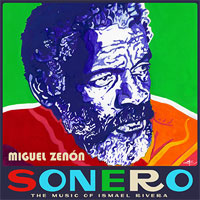Miguel Zenón • Sonero: The Music of Ismael Rivera
 lto saxophonist Miguel
Zenón’s projects betray a couple of preoccupations. One is to develop a distinctive
identity and dynamic for his long-running quartet. The other is to spotlight the riches of
Puerto Rican music (just as Puerto Rican musicians are central to New York’s Latin
jazz/salsa/dance complex). Those preoccupations often dovetail, as on Sonero,
devoted to inventive rearrangements of songs popularized by pop singer and polyrhythmic
scat improviser Ismael Rivera (1931–1987), aka Maelo, whose music is folkloric and
jazzy both -- like Zenón’s own. lto saxophonist Miguel
Zenón’s projects betray a couple of preoccupations. One is to develop a distinctive
identity and dynamic for his long-running quartet. The other is to spotlight the riches of
Puerto Rican music (just as Puerto Rican musicians are central to New York’s Latin
jazz/salsa/dance complex). Those preoccupations often dovetail, as on Sonero,
devoted to inventive rearrangements of songs popularized by pop singer and polyrhythmic
scat improviser Ismael Rivera (1931–1987), aka Maelo, whose music is folkloric and
jazzy both -- like Zenón’s own.
The album begins with a minute of Rivera singing, snipped from a radio interview, so we can hear that voice: lightly hoarse, bearish and conversational, with rhythmic snap. There’s a sliver of his wordless improvising, a sliver that gets cut up and looped for the fade. Zenón’s band also backs the soloist, discreetly: an appetizer for the transformations to come. Zenón seizes elements from Rivera’s recordings and recasts them in ways that show the durability of the 1980s/’90s postmodern toolkit: moving background parts to the foreground, resequencing sections, altering tempo and meter and feel, dramatic change-ups -- but without the pomo-cool detachment, and with more momentum. So the sax-section riff that opens Rivera’s “Quítate de la Vía, Perico,” almost immediately buried under Maelo’s brass section and quilted polyrhythms, becomes Zenón’s obsessive solo alto line on his slowed version. And Rivera’s thicket of ensemble beats has been thinned into a taut unison line for bass and piano, as drummer Henry Cole plays dance beats on the traps. The rhythm trio play breathing expanding/contracting cycles within the form -- as if to underscore how slippery Rivera could be with his own bands. The singer’s beach- bum ode “Colobó” had an unhurried lope to match. Zenón’s version is breezy too, but a quicker tempo lifts the leader’s sails, and his jumpy crew subdivides the beats. Zenón’s (instrumental) voice contrasts with Rivera’s. The altoist’s tone is distinctive, pleading and romantic, with vocalized inflections, and he has a way of generating surging momentum within a phrase. Such ploys could lapse into schmaltz or self-parody if pushed too far, but Zenón’s taste saves him. Hear all the ways he plays repeated notes on the melody statements of “El Negro Bembón.” He can get a happy sound up-tempo, and yelp for pleasure, and play fast passages where he finds time to shape every note. But the tinge of melancholy is never too far off. Miguel Zenón’s quartet has had one personnel change in the 18 years since they first recorded, and the players share the leader’s nimbleness and passion. Luis Perdomo knows all the crisp Latin-piano tropes for texturing backgrounds, and the jazz vocabulary, and all the bridges between and ways they can fit together -- on “Colobó” he swings his solo over lopsided bass and drums. It says something about the global interpenetration of rhythmic vocabularies that the heartbeat of the quartet’s bambas and boleros hails from Austria, Hans Glawischnig whose bass is a multi-pitched low drum, his plucked strings as percussive as hammered piano wires. Henry Cole listens from the drums -- regulates the dynamics and intensity to prod or make way as needed. You could be ignorant of Sonero’s subtitle
or concept and still find the quartet performances compelling. There are sudden
irregular-stoptime episodes, obstacle courses for soloists, slide-rule rhythms and
wafting, drifting bits. The players know how to make it all flow together, so all the side
turns and reversals sound as natural as a river rushing toward the sea. Brian Montgomery
recorded it at Power Station New England. The bass sound is woody and plump, under the
drums without being obscured. The music is romantic enough not to require a wash of
soft-focus reverb, happily dispensed with. Crisper is better where things can happen fast. |
